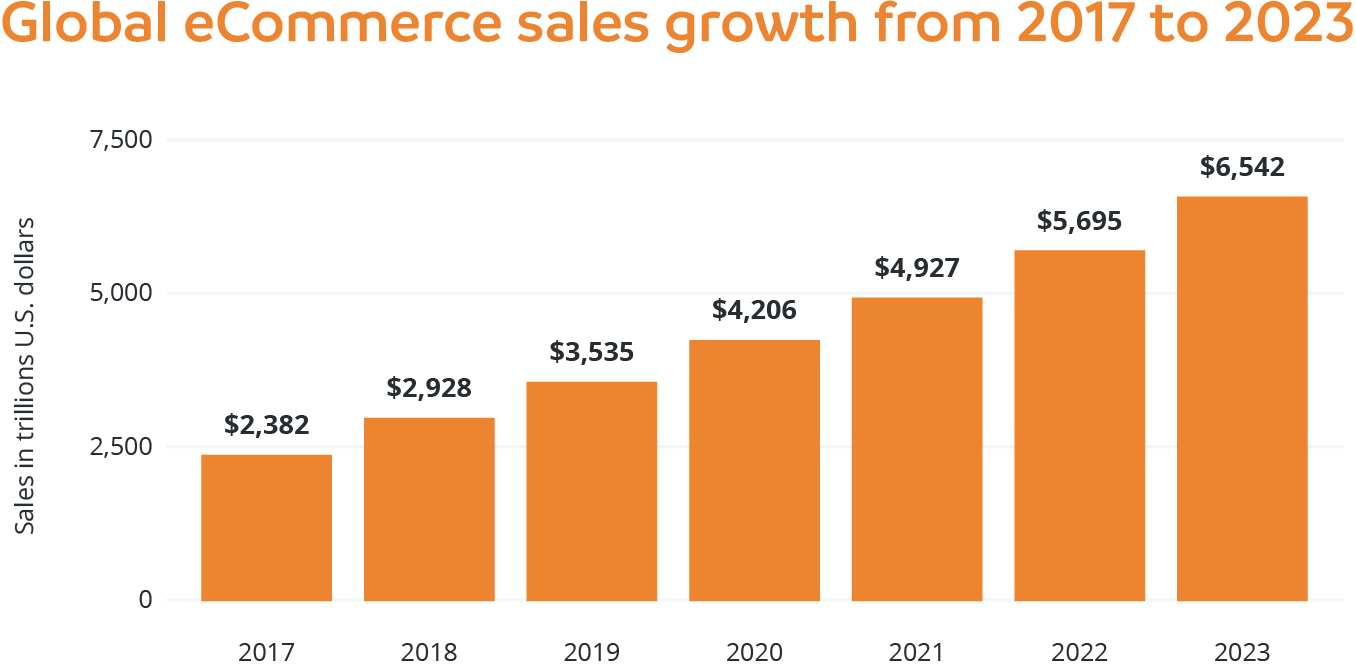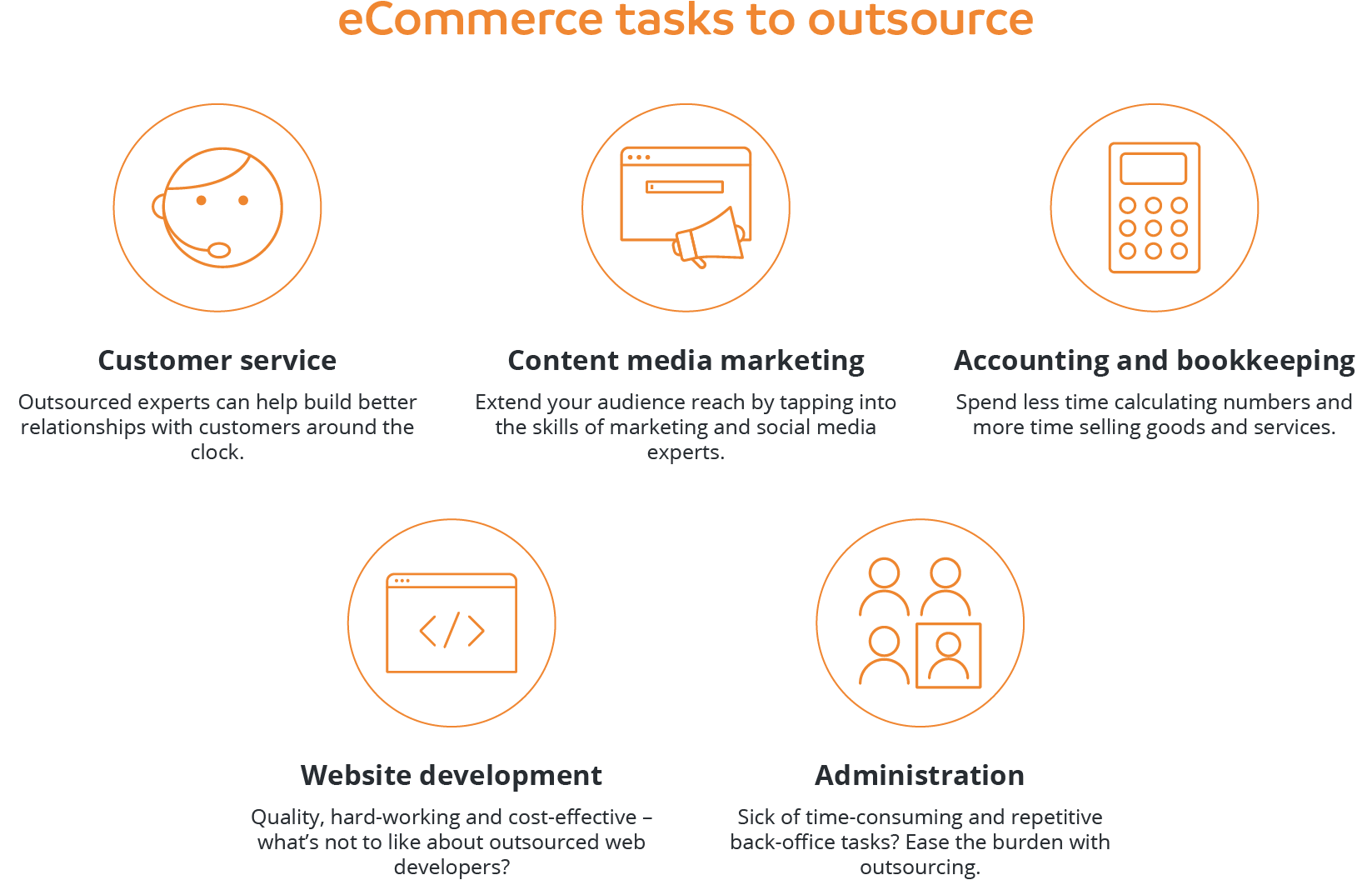How outsourcing is helping deliver retail and eCommerce success

Few sectors ride the economic roller-coaster quite like the retail industry. From the impact of inflation and cost-of-living pressures to the rise of eCommerce and increasing global competition, CFOs and their fellow executives find themselves navigating unique challenges and doing their utmost to balance expenditure with quality. That is not an easy task at the best of times, let alone in a climate where Fitch Ratings is predicting U.S. retail volumes will decline at a low-single-digit rate in 2024, particularly in discretionary categories1.
Thrown into this mix is the post-COVID boom in online and social commerce that, coupled with advancements in artificial intelligence and the metaverse, is reshaping retail strategies. With more than 5 billion internet users worldwide2, global retail eCommerce sales are estimated to exceed $6.3 trillion in 20243 and the likelihood of further growth means some retailers are grappling with the role of traditional brick-and-mortar stores4.
Amid such sweeping changes, one thing that remains constant is that knowledge is power and there is no shortage of forums where CFOs can source quality insights and practical advice about how to stay ahead of competitors in this ever-evolving retail landscape. I had the pleasure of participating in one such forum in recent weeks when the National Online Retailers Association (NORA) invited me to join an online panel discussing how to secure top talent offshore as part of its ‘Future Workplace Transformation’ series.
Along with my MicroSourcing colleague Sean Baker, Barbeques Galore CFO Mitchell Koureas and Adore Beauty Group CXO Nicola Clement, we spent almost an hour exploring how outsourcing is a valuable tool for retail businesses of all sizes to address labor shortages, reduce attrition rates and extend service hours. As opposed to a brief chat, this was a deep dive into a resourcing strategy that is helping countless organizations streamline their operations and access specialized talent pools.
While I would urge all comers to stream the discussion, I know better than most that not everyone will have a spare hour to do so. For that reason, I’ve collated the best of our insights into an easily digestible article that takes readers inside the world of outsourcing and provides a blueprint for retailers and eCommerce outlets wanting to pursue a new way of building a team.

What is outsourcing in retail and eCommerce?
Outsourcing in retail and eCommerce sees organizations partner with external providers to perform tasks that would typically be completed by in-house employees. By outsourcing certain business functions, retailers and eCommerce operators can dedicate more resources to their core capabilities and seamlessly scale up or down depending on economic conditions. Along with multiple tasks being able to be outsourced, businesses can save up to 70% on labor costs by working with external providers.
What are benefits of outsourcing in retail and eCommerce?
There are myriad reasons for retailers to pursue an outsourcing strategy but the most popular include:
- Sustainable growth: it is understandable for retailers and eCommerce businesses to pursue growth but history shows far too many do so in an unsustainable, if not reckless, manner. Engaging an outsourcing provider in developing nations such as the Philippines can save up to 70% on labor and operating costs, which can ease financial pressure and allow organizations to reinvest such savings in other areas of the business.
- Increased efficiencies: nations such as the Philippines have earned a stellar reputation for the level of commitment and enthusiasm shown by their workers, particularly in the highly valued and sought-after field of outsourcing. Assigning time-consuming or specialist tasks to such offshore team members has repeatedly been proven to boost productivity and increase results for many Western retailers.
- Around-the-clock support: between eCommerce sites and online support, today’s retailers know there is an expectation that they provide 24/7 customer service but the reality – and cost – of doing so is not so simple. This is where partnering with offshore providers in different time zones can be a game-changer, with many businesses relishing the chance to significantly bolster their customer service offering.
What are tips for engaging an outsourcing provider?
It is one thing to decide to outsource. It is another to do so in a responsible, strategic and ultimately successful manner.
- Define the problem you want to solve: outsourcing may sound like a great idea but the worst thing retailers can do is take an ad hoc approach to its implementation. As Mitchell from Barbeques Galore explained, his organization started by mapping its processes to identify initial tasks that would be best assigned to external team members. Our experts from MicroSourcing also played a guiding role by helping curate profile descriptions and exploring core issues and non-negotiables. Taking the time to develop a proof of concept also provides credibility when talk turns to expansion of the outsourcing strategy.
- Consider a combination of outsourcing and offshoring: it is a question we have heard countless times – what is the difference between outsourcing and offshoring? My colleague Sean put it best when he said: “Outsourcing is like calling in the experts to handle a specific part of your operation (e.g. Probe Group and customer experience). They manage the entire journey. Offshoring is more about keeping the reins in your own hands and building the expertise in full-time staff who are an extension of your team – just based in another country.” The key is it does not need to be a choice between one and the other, with savvy companies such as Barbeques Galore combining both solutions to enhance it’’s operations.
- Walk before you run: as advocates of outsourcing and offshoring, one might assume Sean and I would urge new clients to assign multiple tasks to external staff. Think again. We believe the best approach is to initially identify one or two suitable roles and ensure they are done properly. Some tasks are perfectly suited to outsourcing – customer service, accounts payable – and achieving successful results with those will help build a case for future expansion. This is far better than moving an entire vertical without considering the full impact of doing so and running the risk of losing currency with key decision-makers.
- Seek organizational buy-in: speaking of key decision-makers, do not underestimate the need to garner support from fellow executives. It is almost inevitable that not everyone will be on board from the start but your ability to turn naysayers into advocates will play a vital role in delivering long-term outsourcing success. This is why it pays to start small as securing early wins is crucial to gaining momentum. Likewise, seeking positive buy-in from rank-and-file team members will go a long way to embedding a culture of outsourcing that can be built on.
- Treat offshore teams as colleagues: during our discussion, Mitchell was asked how Barbeques Galore aligns the goals of its in-house and offshore teams and his response was music to my ears: “We don’t look at it as two teams – it is one team.” Quality outsourcing providers know the importance of breaking down such barriers, with Mitchell’s offshore staff all receiving welcome packs on their first day containing branded T-shirts, hats and lanyards. Senior executives visit their offices in the Philippines every quarter, while an Employee of the Year is also awarded a trip to Australia. It is all about reinforcing they are part of one team on one mission.
- Invest in retention: recruiting quality staff is just the start of a successful outsourcing partnership. Retention is equally important and that is where MicroSourcing prides itself on delivering the goods. As Sean explained, it starts by ensuring offshore staff receive 100% of the salary benefits being offered by our clients. We are fully transparent in that regard and that goes a long way to building trust and earning loyalty from staff. We also host regular performance reviews to ensure they know where they stand, while all staff receive private health insurance, which is a huge factor in the Philippines, and we also offer about 50 training courses as part of our ongoing commitment to upskilling. Throw in the opportunity to join ‘Micro Clubs’ with like-minded colleagues and a range of regular social events and it’s clear that staff retention is an ongoing – and worthwhile – investment.
What retail or eCommerce tasks can be outsourced?

It is tempting to answer this question by asking how long is a piece of string? That said, while the number of tasks that can be outsourced is extensive, there are several retail and eCommerce that particularly lend themselves to external assistance.
- Content marketing: using words, images and videos to attract buyers is a huge part of the modern retail world and many relish the opportunity to partner with highly productive and cost-effective specialists. The creation of blogs, infographics and social media management is ideally suited to outsourcing, which allows in-house teams to dedicate their time to core responsibilities.
- IT and web development: it has never been more important for retailers to have a strong digital presence but many businesses, particularly smaller operators, find themselves overwhelmed or simply incapable of delivering on this imperative. Fortunately, the quality of outsourced IT support and web developers has never been stronger.
- Administration: few things are more frustrating than launching a retail or eCommerce business only to increasingly find the majority of one’s time is being spent on repetitive and mundane back-office tasks such as payroll, HR and bookkeeping. Little wonder then that so many retailers jump at the chance to free up resources and save on costs by outsourcing such tasks.
Summary
While our NORA TV discussion was a great insight into the world of outsourcing and offshoring, real change starts with a conversation. There is much to be gained from taking a different approach to resourcing in the retail and eCommerce space and that is where it pays to talk with an expert.
The lack of a physical retail assistant no longer needs to be a barrier to great eCommerce customer experience. Discover how AI-powered chatbots are changing the way online businesses deliver customer service.
About the Author
Nathan Stewart is a strategic leader who understands how to drive growth and build high-performing teams. With more than two decades’ experience in business development, he takes great pride in helping MicroSourcing’s clients achieve their offshoring goals in the Philippines while retaining full control over KPIs, quality, workflow and productivity.
Reference:
[1] U.S. Retailing Outlook 2024 (fitchratings.com)
[2] Number of internet users worldwide 2022 | Statista
[3] Global retail e-commerce sales 2014-2027 | Statista
[4] Online vs. in-person shopping | The Week
Popular posts
Browse by topic
- Accounting
- Accounting & Finance
- All Industries
- Banking
- BPO/RPO/HRO
- Communication
- CSR & ESG
- Customer & Client Acquisition
- Customer Experience
- Cybersecurity
- Cybersecurity & Compliance
- Data Management
- Digital Operations
- Digital Transformation
- eCommerce
- Education
- Employee Engagement
- Engineering & Construction
- Financial Services
- Healthcare
- Hospitality and tourism
- HR & Recruitment
- Information Technology
- Insurance
- Legal Services
- Logistics
- Offshoring & Outsourcing
- Outsourcing
- Professional Services
- Real Estate
- Retail & eCommerce
- Startups
- Talent Acquisition and Retention
- Technology
- Trends & Guides
- Workforce Integration
Related Posts
How employers can reduce healthcare costs
A lot has been written about how the working world has changed in the wake of the COVID-19 pandemic. Where many managers once linked productivity..
Defining data – the difference between data privacy, data security and data protection
There is no shortage of issues that can inspire sleepless nights for business leaders. Talent shortages, regulatory pressures, shrinking budgets and..
Is offshore staffing the key to data compliance?
With entire websites dedicated to exposing businesses daily that have been hacked or have had their data breached daily, it’s no wonder why data..
